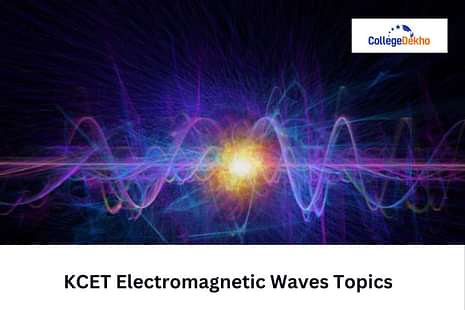KCET Electromagnetic Waves Topics 2026 include Displacement Current, Electromagnetic Waves, Characteristics of Electromagnetic Waves etc. Aspirants of the KCET 2026 exam can expect 2-3 questions from the Electromagnetic Waves Chapter.

KCET Electromagnetic Waves Topics 2026:
Electromagnetic Waves is one of the important chapters in the KCET 2026 examination. KCET Electromagnetic Waves Topics 2026 include Displacement Current, Electromagnetic Waves, Characteristics of Electromagnetic Waves etc. Students planning to appear for the
KCET 2026
exam must note that Electromagnetic Waves will carry 2-3 questions from the second-year physics PUC syllabus. Candidates can obtain 6 to 9 marks if they master KCET 2026 Electromagnetic Waves topics. The KCET Electromagnetic Waves syllabus focuses on understanding the nature, origin, and properties of electromagnetic radiation, including key aspects such as displacement current, the production of electromagnetic waves, and their transverse nature. Students are expected to comprehend how electric and magnetic fields are mutually perpendicular and also perpendicular to the direction of wave propagation. Emphasis is also laid on the speed of electromagnetic waves in vacuum, its relation to the permittivity and permeability of free space, and how this theoretical prediction aligns with the experimentally observed speed of light. Electromagnetic Waves is considered a high-yield and scoring topic in KCET Physics due to its limited syllabus and strong conceptual focus. With a clear grasp of definitions, fundamental principles, and applications, students can confidently attempt both direct and conceptual questions from this chapter.
Also Read:
KCET Electromagnetic Waves Weightage 2026
KCET Electromagnetic Waves Topics 2026
Here is the list of topics covered in KCET Electromagnetic Waves:
- Displacement Current: Need of displacement current, expression of displacement current, expression of displacement current, expression for Ampere-Maxwell law
- Electromagnetic Waves
- Characteristics of Electromagnetic Waves (Expression of speed of light)
- Electromagnetic Spectrum: Wavelength range & their uses
Topics in Electromagnetic Waves | Brief Explanation |
|---|---|
Displacement Current | A time-varying electric field called displacement current helps keep a magnetic field continuous. |
Electromagnetic Waves | One type of radiation that moves through the entire universe is electromagnetic waves. They are created when a magnetic field and an electric field integrate. |
Characteristics of Electromagnetic Waves |
|
Electromagnetic Spectrum | The entire spectrum of electromagnetic radiation, arranged according to wavelength or frequency, is known as the electromagnetic spectrum. |
Also Check - KCET Subject Wise Syllabus 2026
What are Electromagnetic Waves?
The electromagnetic waves term comes from Physics, which means a type or form of radiation that travels through the universe. The waves which are created using the vibrations between the magnetic field and electric field are called electromagnetic waves known as EM waves.
For Example: The radio waves, visible light, x-rays, gamma rays, and others are examples of electromagnetic waves.
Electromagnetic Waves: Types & Definitions
Here are some important types and definitions that will help the students understand the basics of this chapter, they can refer to the type of electromagnetic waves here:
Types of Electromagnetic Waves | Definitions |
|---|---|
Gamma Rays | The highest energy and shortest wavelength, used to study nuclear processes and treat cancer. |
X-Rays | Higher-energy waves are employed in security screening and medical imaging (X-rays). |
Ultraviolet rays | A kind of light with a wavelength between 100 and 400 nanometers (nm) that is part of the electromagnetic spectrum: |
Visible light | The only part that the human eye can see, it serves a variety of purposes from optical communications to others. |
Infrared light | A kind of electromagnetic radiation that falls between the microwave and visible ends of the light spectrum. It has a wavelength between 800 nm and 1 mm. |
Microwaves | With wavelengths longer than infrared waves but shorter than other radio waves, microwaves are a kind of electromagnetic radiation. Electromagnetic waves with wavelengths as long as one meter and as short as one millimetre are known as microwaves. |
Radio Waves | Used in systems like radios and other communication systems, radio waves have the longest wavelengths. |
Types of Radiation, Frequency, & Wavelength Range
Refer to the tabular representation below for the types of radiation, frequency, and their wavelength range.
Type of Radiation | Frequency Range (Hz) | Wavelength Range |
|---|---|---|
Gamma-rays | 1020 – 1024 | < 10-12 m |
X-rays | 1017– 1020 | 1 nm – 1 pm |
Ultraviolet | 1015 – 1017 | 400 nm – 1 nm |
Visible | 4 x 1014 – 7.5 x 1014 | 750 nm – 400 nm |
Near-infrared | 1 x 1014 – 4 x1014 | 2.5 μm – 750 nm |
Infrared | 1013 – 1014 | 25 μm – 2.5 μm |
Microwaves | 3 x 1011 – 1013 | 1 mm – 25 μm |
Radio waves | < 3 x 1011 | > 1 mm |
Tips & Tricks to Study Electromagnetic Waves Chapter
KCET aspirants can refer to the tricks & tips here to study the electromagnetic chapter and cover the basics easily.
- Understand Core Concepts: Applicants need to have an understanding of all the core concepts of the electromagnetic waves chapter so that they can easily solve the questions even if they are out of the syllabus.
- Make Short Notes: It is also beneficial to make notes on the chapter that you are reading, it helps you during the revision time. You can quickly take help of the notes and revise during the end days as the exam approaches.
- Write Down Formulas: It is important to memorize the formulas to solve the questions based on equations in the exam. The best way to memorize the formulas is by writing them down.
- Solve Practice Papers of the Chapter: Solve the electromagnetic waves chapter practice papers in a given time frame to judge your speed and performance for the exam.
- Refer to NCERT Books: NCERT books are the best for any exam preparation. Applicants can study from the NCERT books first and then go through the other reference books.
- Time Management: Learn time management and divide your time according to the weightages of the chapter. Study the chapters with maximum weightage first and then study the chapters with less weightage.
We hope that these tips & tricks here will help the KCET aspiring students to prepare well for the electromagnetic waves chapter.
Quick Links:
| How to Score 50+ Marks in KCET Chemistry 2026? | How to Score 50+ Marks in KCET Maths 2026? |
|---|---|
| How to Score 50+ Marks in KCET Biology 2026? | KCET 2026 Maths 30 Days Preparation Plan |
Best Books for KCET Physics Preparation
Refer to the best books for KCET physics preparations here:
- NCERT class 11 and 12 books for physics
- Fundamental of physics by S Chand
- Physics for Karnataka CET & COMEDK
- Fundamentals of physics by Pradeep
Related Article: Most Important Topic & Weightage for KCET 2026 Chemistry
If you are looking for admission into the top private engineering colleges in India 2026 , you can just fill out the Common Application Form on our website. It is a single application form for admission into various universities. For more articles and updates on KCET 2026, stay tuned with CollegeDekho.
Are you feeling lost and unsure about what career path to take after completing 12th standard?
Say goodbye to confusion and hello to a bright future!

FAQs
The cutoff of KCET refers to the minimum marks required by candidates to qualify for the KCET exam. KEA KCET cutoff is released separately for the general merit and Hyderabad Karnataka region. The exam authority releases the KCET cutoff after each counselling round.
It is not mandatory to attempt the Biology paper in the KCET exam if you want to opt for Engineering. Biology marks are only considered for the Medical, Dental and Paramedical fields. However, if you want to pursue Biotechnology in Engineering, attempting Biology in the KCET exam is compulsory.
50% mark is the passing percentage for the general category candidates and 40% for the SC/ST/OBC category for the KCET exam.
Candidates cannot skip Mathematics in the KCET exam. Mathematics is a mandatory subject in the KCET exam, and skipping it would disqualify candidates from the KCET examination.
Candidates looking to score good marks in the Karnataka CET exam are advised to solve the KCET previous year question papers and mock tests. Solving PYQs of KCET will enable candidates to get an idea about the KCET question paper pattern and the marking scheme.
The identical chapters and subjects from Classes 11 and 12 are covered by the questions in both KCET and JEE Main exams. However, in comparison to KCET, the questions in the JEE Main exam are more difficult.
Chapters with maximum weightage in KCET Physics are Gravitation, Motion in a Straight Line, Oscillations and Thermodynamics since they carry 7% to 8% weightage. Important chapters for KCET Maths comprise Integration, Vectors, Permutation and Combination, and 3-D Geometry which weigh around 6% to 7% in the KCET exam.
Was this article helpful?




















Similar Articles
JEE Main 2026 January 21 Exam Analysis: Shift 1 and 2 Subject-Wise Difficulty Level, Good Attempts
Topic-wise Predicted Number of Questions in JEE Main Chemistry 2026 Session 1
Topic-wise Predicted Number of Questions in JEE Main Physics 2026 Session 1
Most repeated questions for JEE Advanced 2026
What is the Difference Between JEE Main & JEE Advanced?
JEE Main 2026 Cutoff for IIITs